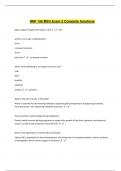HNF 150 MSU Exam 3 Complete Solutions
Major organ through which water is lost ✔️✔️skin
which is not a sign of dehydration?
thirst
increased urination
shock
pale skin ✔️✔️increased urination
Which of the following is not a good source of zinc?
milk
beef
shellfish
potatoes
poultry ✔️✔️potatoes
What is the role of water in the body?
Water is essential for maintaining hydration, regulating body temperature, transporting nutrients,
removing waste, and supporting metabolic processes. ✔️✔️
How do protein needs change during pregnancy?
Protein needs increase during pregnancy to support the growth of the fetus, placenta, and maternal
tissues, as well as the production of breast milk. ✔️✔️
What is the significance of vitamin B6 in the body?
Vitamin B6 is important for brain development, the production of neurotransmitters, and the synthesis
of hemoglobin, which carries oxygen in the blood. ✔️✔️
,How does the body regulate blood sugar levels after fasting?
After fasting, the pancreas releases glucagon, which stimulates the liver to release stored glucose
(glycogen) into the bloodstream to maintain normal blood sugar levels. ✔️✔️
What is the difference between saturated and unsaturated fats?
Saturated fats are typically solid at room temperature and can raise LDL cholesterol levels, while
unsaturated fats are liquid and can help lower cholesterol levels when consumed in moderation.
✔️✔️
How does the body use vitamin C for immune defense?
Vitamin C supports the immune system by enhancing the function of white blood cells, increasing the
production of antibodies, and acting as an antioxidant to protect against infections. ✔️✔️
What are the effects of an iron deficiency on the body?
Iron deficiency can lead to anemia, causing symptoms such as fatigue, weakness, and impaired cognitive
function due to insufficient oxygen transport in the blood. ✔️✔️
How does the body store and use glucose for energy?
Glucose is stored in the liver and muscles as glycogen and is broken down into glucose when needed for
energy during physical activity or fasting. ✔️✔️
Why is folate important during early pregnancy?
Folate is crucial during early pregnancy for proper fetal neural tube development, which helps prevent
birth defects like spina bifida and anencephaly. ✔️✔️
What is the function of the thyroid gland in metabolism?
The thyroid gland produces hormones (T3 and T4) that regulate metabolism, controlling energy
production, temperature regulation, and overall growth and development. ✔️✔️
How do probiotics benefit gut health?
, Probiotics are beneficial bacteria that promote a healthy balance in the gut microbiome, support
digestion, and boost the immune system. ✔️✔️
What is the role of zinc in wound healing?
Zinc supports collagen synthesis and immune function, which are both necessary for proper wound
healing and tissue repair. ✔️✔️
How do the kidneys regulate electrolyte balance?
The kidneys regulate electrolyte balance by filtering blood, reabsorbing necessary ions (such as sodium
and potassium), and excreting excess ions through urine. ✔️✔️
What are the consequences of a vitamin D deficiency?
Vitamin D deficiency can lead to weakened bones (osteomalacia or rickets), muscle weakness, and an
increased risk of infections and chronic diseases. ✔️✔️
How does alcohol affect the absorption of nutrients?
Alcohol interferes with the absorption of vitamins and minerals, particularly B vitamins, calcium,
magnesium, and zinc, by damaging the digestive lining. ✔️✔️
What is the difference between anaerobic and aerobic exercise?
Anaerobic exercise involves short bursts of high-intensity activity (e.g., weightlifting), while aerobic
exercise requires sustained effort over a longer period and uses oxygen to produce energy (e.g.,
running). ✔️✔️
How do antioxidants help reduce the risk of chronic diseases?
Antioxidants neutralize free radicals that can damage cells and tissues, reducing the risk of chronic
diseases like cancer, heart disease, and neurodegenerative disorders. ✔️✔️
What is the role of cholesterol in the body?
Cholesterol is essential for producing hormones, vitamin D, and bile acids that help digest fats. It is also a
vital component of cell membranes. ✔️✔️




